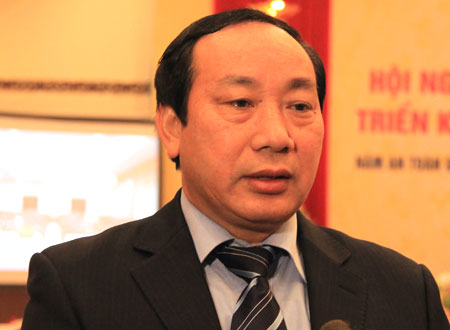State Audit steps in to save Hanoi sky train
 The auditing agency has been asked to get involved due to delays of the sky train project and reports that show a considerably higher construction cost than previously estimated.
The auditing agency has been asked to get involved due to delays of the sky train project and reports that show a considerably higher construction cost than previously estimated.
The key transport project got approval from the prime minister as an engineering-procurement-construction (EPC) contract. The project’s key bidding package (package 1) involves design, equipment supply, materials and construction and was granted to China’s Railway 6th Bureau Group Company.
Apart from technical infrastructure, the Chinese contractor would also provide 13 trains, each consisting of four carriages with a carrying capacity of around 300 passengers per time.
The launching ceremony took place in October 2011 and local developer granted the EPC contract, valued at $350 million, to the Chinese side back in May 2009. The document stipulated that construction must not exceed 48 months except for delays caused by uncontrollable factors.
In the four years since, the project timeline has been revised several times, now with a deadline of June 2015.
According to Ministry of Transport (MoT) appraisals, total completed work by the end of November 2013 was VND2.230 trillion ($106 million), 28 per cent of the project’s total value.
As well as construction, it is important to have a business established to conduct management and operations right from the outset, though as of yet there is no such business, making it difficult to source manpower to eventually work on the train’s operations.
“SAV was asked to step in to ensure investment procedures are followed and the contract is adhered to, as well as to ensure there are no losses sustained by the state,” said Truong.
A lack of experience and the poor capacity of the developer and Project Management Unit overseeing the EPC contract were blamed for the project’s poor performance.
Head of the Railway Project Management Unit Tran Van Luc said that despite its position as a major railway contract in China, China Railway 6th Bureau Group has little experience with international EPC contracts.
“Consequently, although the EPC agreement rules that the contractor must take charge of design, equipment, and execution, our management unit has had to take part in nearly every phase of the project,” Luc added.
“The contract and associated consulting unit are too dependent on instructions from the developer.”
According to a source from the MoT, current regulations on management and execution of EPC contracts are unclear, lacking specific regulations on the responsibilities of parties in terms of progress and investment.
Site clearance has been a major problem with the project. At current, there is still an issue with clearing 3km of the 13km main line and 800 metres of the 1.5km approach line whereas site clearance was slated to be finished by February 2010.
According to a Chinese source, if site clearance cannot be completed by the end of this year, the project will again face delays.
“It is hoped the SAV will identify the problems and help revive progress of this important project,” said a source from the MoT.
The Hanoi urban railway line project’s Cat Linh-Ha Dong route is being developed by the Vietnam Railway Administration.
Total investment capital - VND8.770 trillion ($552 million), of which $419 million is sourced through Chinese loans.
The project envisions building a 13km long aerial tram line with a maximum velocity of 80km per hour per (average speed: 35km/hour).
Estimated transport capacity is 28,000 passengers/hour/one direction, with 12 train stations.
What the stars mean:
★ Poor ★ ★ Promising ★★★ Good ★★★★ Very good ★★★★★ Exceptional
Latest News
More News
- Site clearance work launched for Dung Quat refinery upgrade (February 04, 2026 | 18:06)
- Masan High-Tech Materials reports profit: a view from Nui Phao mine (February 04, 2026 | 16:13)
- Hermes joins Long Thanh cargo terminal development (February 04, 2026 | 15:59)
- SCG enhances production and distribution in Vietnam (February 04, 2026 | 08:00)
- UNIVACCO strengthens Asia expansion with Vietnam facility (February 03, 2026 | 08:00)
- Cai Mep Ha Port project wins approval with $1.95bn investment (February 02, 2026 | 16:17)
- Repositioning Vietnam in Asia’s manufacturing race (February 02, 2026 | 16:00)
- Manufacturing growth remains solid in early 2026 (February 02, 2026 | 15:28)
- Navigating venture capital trends across the continent (February 02, 2026 | 14:00)
- Motivations to achieve high growth (February 02, 2026 | 11:00)
















 Mobile Version
Mobile Version